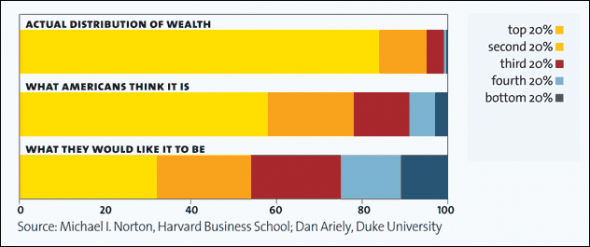The notion that somebody is “gaming the system” is a paranoid but convenient fiction that keeps us from realizing how broken everything really is.
Stories have a peculiar property: they dazzle us by making sense of the bits of pieces they tell us about, and at the same time they make us forget all kinds of stuff they’re leaving out. This is especially effective with that class of narratives we collectively “tell ourselves.”
This isn’t exactly news, but that’s the point:
[Carl Gibson, the founder of US Uncut] explains: “I have one dollar in my wallet. That’s more than the combined income tax liability of GE, ExxonMobil, Citibank, and the Bank of America.”
And even that story is leaving something out—which becomes clearer when he continues: “That means somebody is gaming the system.” The notion that somebody is “gaming the system” is just another convenient fiction that keeps us from realizing that the system is broken. Yes, there are strata of people who are profiting from tweaking the system’s systematic brokenness to their advantage, but it is the system that, in a way, is gaming us all. Maybe it’s already too late to do anything about it; maybe a memeplex (global economy) and a temeplex (global networks) have teamed up to further their own “selfish interests” as ruthless replicators, and all that’s left for humans are stories of global paranoia.
Which also shouldn’t be news. In Postmodernism, or, The Cultural Logic of Late Capitalism (Durham: Duke UP, 1991), Fredric Jameson put it like this:
I want to suggest that our faulty representations of some immense communicational and computer network are themselves but a distorted figuration of something even deeper, namely, the whole world system of a present-day multinational capitalism. The technology of contemporary society is therefore mesmerizing and fascinating not so much in its own right but because it seems to offer some privileged representational shorthand for grasping a network of power and control even more difficult for our minds and imaginations to grasp: the whole new decentered global network of the third stage of capital itself. This is a figural process presently best observed in a whole mode of contemporary entertainment literature—one is tempted to characterize it as “high-tech paranoia”—in which the circuits and networks of some putative global computer hookup are narratively mobilized by labyrinthine conspiracies of autonomous but deadly interlocking and competing information agencies in a complexity often beyond the capacity of the normal reading mind. (37–38)
You don’t have to be a Marxist (and most certainly I am not one) to see Jameson’s point: we have transformed the networked economy’s systemic logic into a narrative logic that reveals as much as it conceals, a narrative logic that provides us with stories that make us feel bad, but also with expectations of narrative structure that keep us from losing hope. For the individual, this collective narrative may break down anytime, e.g., if she is downsized while the company she worked for is making record profits, her home foreclosed,* and forced out on the street with her spouse and children while the politicians she voted for take all her bargaining rights away. But even if pizzas are sent from Egypt to Wisconsin demonstrators, nothing changes collectively, and within that infinitely elastic story that we tell ourselves, fact is overruled by perception openly and persistently:
And no, this isn’t going to get better. What we perceive as something like a minimum “systemic fairness” in our global economies, a fairness where the rich might get richer and richer but everybody else at least doesn’t go from poor to destitute as a consequence, that perception is precisely our collective narrative. A narrative with the economic system as our heroine at the end of the next-to-last chapter where the crisis peaks by design and everything seems lost, but only for the moment. What this narrative leaves out and this story doesn’t tell us is that our heroine contracted all kinds of deadly cancers from the 80s onward and is dying at an asymptotic, yet ever-accelerating pace.
* foreclosuresamerica.com used to document these foreclosures but is now, well, closed, and the domain’s been put up for sale by a domain grabber.
Concerning Comments
While I disabled comments ages ago, I preserved legacy comments. However, as each page with active comments throws a critical error for inexplicable reasons—even with all plugins deactivated—I attached all legacy comments as images with ALT texts instead.
If you have something valuable to add or some interesting point to discuss, I’ll be looking forward to meeting you at Mastodon!


![Siggi [ https://www.siggibecker.de/blog/ ]
February 27, 2011 • 19:52
My recommendation: http://www.amazon.de/Treasure-Islands-Havens-Stole-World/dp/1847921108/](https://betweendrafts.com/wp-content/uploads/2011/02/comments-2011-02-27.png)
